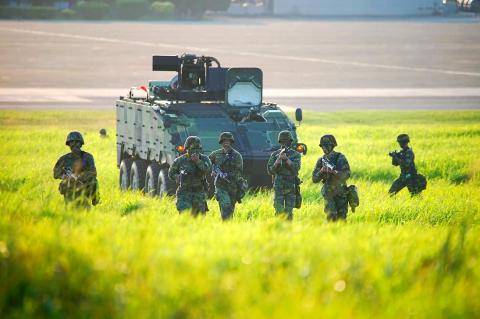The Taichung District Prosecutors’ Office yesterday indicted 33 people, including military officers and employees, as well as nine contractors, over their roles in a NT$4.8 billion (US$146.12 million) procurement scandal involving the production of CM-32 “Clouded Leopard” armored vehicles.
Leading the list of indictees were Chung Hsin Electric and Machinery Manufacturing chairman Chiang Yi-fu (江義福), Yi Rong Technology Co owner Chang Kuang-ming (張光明) and Chi Fu Industrial owner Hsu Ching-shun (許清順), who were charged with violating the Anti-Corruption Act (貪污治罪條例).
The three companies, along with six other contractors, were also charged with breaking the Government Procurement Act (政府採購法) by “borrowing” qualification certifications from other companies to be able to bid for military procurement tenders.

Photo: CNA
Corruption charges were laid against procurement officer Sergeant Major Wang Chien-hsin (王建興) and technician Lee Ti-kuang (李迪光) of the army’s Ordnance Readiness Development Center (ORDC), who allegedly received NT$850,000 and NT$1.17 million respectively in bribes, along with Lee Hsin-jung (林幸蓉), an employee at the Armaments Bureau, for forgery and accounting fraud.
The case stems from a 2012 tender to provide chassis, power equipment and assembly work for the CM-32 armored vehicles, with Chung Hsin Electric securing the project with a bid of NT$4.8 billion, which was well below the stated minimum of NT$7.8 billion.
According to investigators, Chiang colluded with other company owners or executives to forge documents, make deceitful transactions, fake business agreements and other fraudulent accounting practices.
The contractors allegedly bribed military procurement officers and ORDC employees to “go easy” on inspection checks and acceptance tests, while providing substandard components and accessories, most of which came from China.
For example, investigators found that for the armored vehicle’s power system, the contractors imported from China low-price refurbished hydraulic pumps (which cost NT$35,000 per unit, but were listed on record as costing NT$150,000) and steering mechanisms (cost NT$23,000, but recorded as NT$190,000).
Prosecutors said that during the investigation, they uncovered by chance another corruption case involving repair works on M60A3 main battle tanks.
They said that Chiang Tuan Industrial Co is suspected of supplying substandard wheels and metal tread plates from other countries, contravening rules of the tender that the products must be made by Taiwanese companies.
Various problems with the power system and a high breakdown rate have plagued the locally manufactured armored vehicles, prompting suspicions about the use of substandard components and collusion with contractors during the procurement and testing processes.

A preclearance service to facilitate entry for people traveling to select airports in Japan would be available from Thursday next week to Feb. 25 at Taiwan Taoyuan International Airport, Taoyuan International Airport Corp (TIAC) said on Tuesday. The service was first made available to Taiwanese travelers throughout the winter vacation of 2024 and during the Lunar New Year holiday. In addition to flights to the Japanese cities of Hakodate, Asahikawa, Akita, Sendai, Niigata, Okayama, Takamatsu, Kumamoto and Kagoshima, the service would be available to travelers to Kobe and Oita. The service can be accessed by passengers of 15 flight routes operated by

Chinese spouse and influencer Guan Guan’s (關關) residency permit has been revoked for repeatedly posting pro-China videos that threaten national security, the National Immigration Agency confirmed today. Guan Guan has said many controversial statements in her videos posted to Douyin (抖音), including “the red flag will soon be painted all over Taiwan” and “Taiwan is an inseparable part of China,” and expressing hope for expedited reunification. The agency last year received multiple reports alleging that Guan Guan had advocated for armed reunification. After verifying the reports, the agency last month issued a notice requiring her to appear and explain her actions. Guan

GIVE AND TAKE: Blood demand continues to rise each year, while fewer young donors are available due to the nation’s falling birthrate, a doctor said Blood donors can redeem points earned from donations to obtain limited edition Formosan black bear travel mugs, the Kaohsiung Blood Center said yesterday, as it announced a goal of stocking 20,000 units of blood prior to the Lunar New Year. The last month of the lunar year is National Blood Donation Month, when local centers seek to stockpile blood for use during the Lunar New Year holiday. The blood demand in southern Taiwan — including Tainan and Kaohsiung, as well as Chiayi, Pingtung, Penghu and Taitung counties — is about 2,000 units per day, the center said. The donation campaign aims to boost

The Central Weather Administration (CWA) said a magnitude 4.9 earthquake that struck off the coast of eastern Taiwan yesterday was an independent event and part of a stress-adjustment process. The earthquake occurred at 4:47pm, with its epicenter at sea about 45.4km south of Yilan County Hall at a depth of 5.9km, the CWA said. The quake's intensity, which gauges the actual effects of a temblor, was highest in several townships in Yilan and neighboring Hualien County, where it measured 4 on Taiwan's seven-tier intensity scale, the CWA said. Lin Po-yu (林柏佑), a division chief at the CWA's Seismological Center, told a news conference